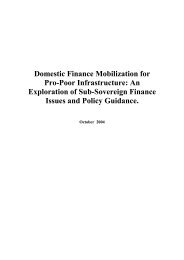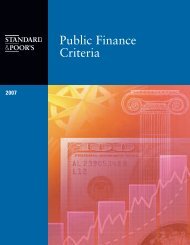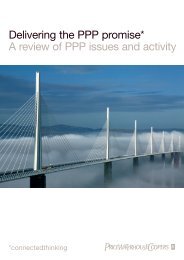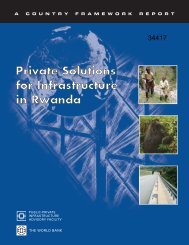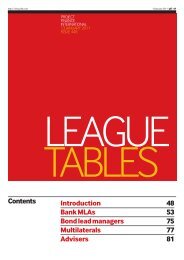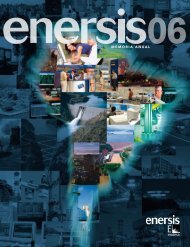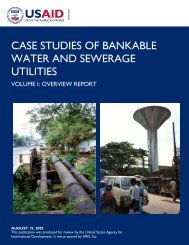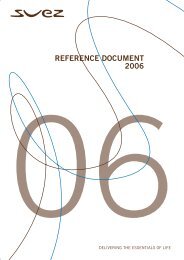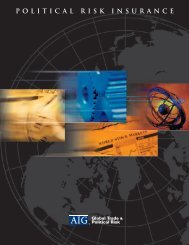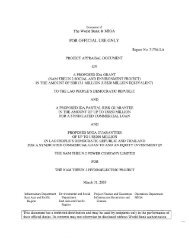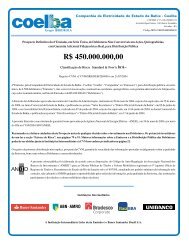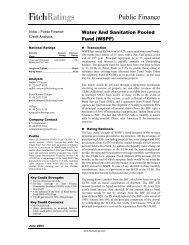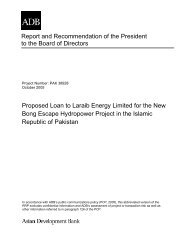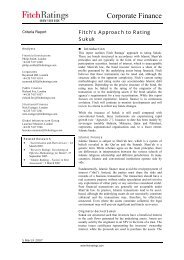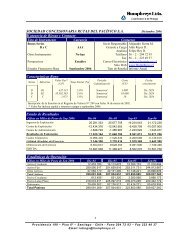EAP - The Pacific Infrastructure Challenge - World Bank (2006).pdf
EAP - The Pacific Infrastructure Challenge - World Bank (2006).pdf
EAP - The Pacific Infrastructure Challenge - World Bank (2006).pdf
You also want an ePaper? Increase the reach of your titles
YUMPU automatically turns print PDFs into web optimized ePapers that Google loves.
good example of this. <strong>The</strong> Kiwi Share is a contractual agreement requiring<br />
Telecom New Zealand (New Zealand’s incumbent operator) to make<br />
ordinary residential telephone service widely available, charge no more<br />
than the standard rate for ordinary residential telephone service and<br />
maintain free local calls for ordinary residential telephone service, fax and<br />
internet. All telecommunications service providers are required to<br />
contribute to the costs of the TSO through a premium on prices for<br />
interconnection with Telecom’s network. This is calculated and monitored<br />
by the Telecommunications Commissioner<br />
Universal Service Funds: <strong>The</strong>se funds, also called Telecommunications<br />
Development Funds, have implemented service expansion through a<br />
reverse auction process in which the operator which demands the lowest<br />
subsidy to extend mainline, mobile or internet services into rural or<br />
sparsely populated areas wins a contract to do so. <strong>The</strong> subsidy is financed<br />
through direct Government contribution, radio license fees or a levy on all<br />
major operators. This method has been employed successfully in the<br />
Dominican Republic.<br />
Price<br />
Figure A.5 compares the costs for three minute local, international and off peak<br />
mobile calls in <strong>Pacific</strong> and comparator countries. <strong>The</strong>se graphs show that many<br />
<strong>Pacific</strong> countries have relatively high international calling tariffs, but local and mobile<br />
calls rates are similar to comparator countries 31 .<br />
Figure A.5: Cost of a Three Minute Call: Local, International and Mobile (off peak)<br />
12<br />
0.25<br />
10<br />
US$ per 3 minutes<br />
0.2<br />
0.15<br />
0.1<br />
0.05<br />
0<br />
New Zealand<br />
1.2<br />
Samoa<br />
Mauritius<br />
Tonga<br />
Fiji<br />
Jamaica<br />
SolomonIslands<br />
PNG<br />
Saint Lucia<br />
Grenada<br />
St Kitts<br />
Kiribati<br />
Dominica<br />
Vanuatu<br />
US$ per 3 minutes<br />
8<br />
6<br />
4<br />
2<br />
0<br />
Jamaica<br />
Tonga<br />
New Zealand<br />
St Kitts<br />
Mauritius<br />
East Timor<br />
Barbados<br />
Fiji<br />
Samoa<br />
PNG<br />
Philippines<br />
FSM<br />
Kiribati<br />
Vanuatu<br />
Solomon Islands<br />
1<br />
US$ per 3 minutes off peak<br />
0.8<br />
0.6<br />
0.4<br />
0.2<br />
0<br />
Tonga<br />
Mauritius<br />
Philippines<br />
Marshall Islands<br />
Fiji<br />
Grenada<br />
Jamaica<br />
PNG<br />
New Zealand<br />
St Kitts<br />
Solomon Islands<br />
Kiribati<br />
Barbados<br />
FSM (Fed. States of)<br />
Source: ITU Data 2002<br />
31 Note: International calling rates in the <strong>Pacific</strong> are based on different zones. <strong>The</strong>se are defined by<br />
distance and do not accurately reflect the cost to the operator. For example, in Samoa calls to the US<br />
are relatively expensive as the US falls into ‘Zone 4’, but it is relatively cheap for the operator to<br />
deliver traffic to the US. <strong>The</strong> cost is therefore disproportionate. When comparing local call costs, bear<br />
in mind that Vanuatu has a single rate for calling anywhere in the country, while in New Zealand<br />
residential local calls are free, and the cost is recovered in a monthly access charge.<br />
82



